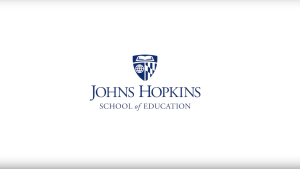Application Details
Prerequisites
Applicants must hold a four-year bachelor’s degree and master’s degree from a regionally accredited college or university (or equivalent from an international institution) and have at least three years of relevant work experience.
Previous degrees must demonstrate high academic achievement with a minimum GPA of 3.25 in an area of study related to the program objectives.
Master’s Degree Requirements
Students with a master’s degree containing at least 30 but fewer than 36 credits may be considered for admission but must complete additional graduate credits at a regionally accredited institution either before or during EdD program matriculation.
Applicants with in-progress master’s degrees must complete and confer their degree before starting their first semester. Failure to submit a final official transcript with degree conferral will result in administrative withdrawal.
Application Requirements and Deadlines
| Doctor of Education (EdD) | ||
|---|---|---|
| Application Deadline | January 21, 2026 All materials, including official transcripts and letters of recommendation, must be received by the Admissions Office by January 21, 2026 for full consideration. | |
| Required Materials | Online application form | |
| Application Fee | $80.00 | |
| Resume/CV | Submit a current resume demonstrating at least three years of professional experience in education or a closely related field. | |
| Problem of Practice (POP) Application Essay | Understanding a Problem of Practice A Problem of Practice is a real-world educational challenge that impacts teaching, learning, outcomes, or professional development. It must be: 1. Rooted in your professional context - exists in your current work environment 2. Actionable - can be improved through research, intervention, or policy change 3. Learning-focused - affects educational outcomes or professional growth 4. Context-specific - occurs in a particular setting with identifiable stakeholders | |
| Pre-Writing Reflection Questions • What persistent workplace challenge consistently limits organizational effectiveness? • Who is most affected, and what evidence demonstrates this impact? • What underlying factors cause this problem to persist? • How does this problem relate to broader educational inequities? • What assumptions should you examine or challenge? • What evidence confirms this problem is worth addressing? | ||
| Essay Requirements • Word Limit: 750 words maximum • Evaluation Criteria: Graduate-level writing, critical thinking, and problem-solving ability | ||
| Essay Structure Address these four components: 1. Problem Significance - Why this problem deserves attention, including specific impacts 2. Root Cause Analysis - Underlying factors, systems, or assumptions creating the problem 3. Potential Solutions - Specific actions that could address the situation 4. Expected Outcomes - Anticipated benefits of resolution | ||
| Program Areas of Interest Select one or two thematic areas connecting to your Problem of Practice: 1. Entrepreneurial Leadership in Education 2. Learning Design and Technology (formerly DALET) 3. Neurodiversity and Neuroeducation (includes Mind, Brain, and Teaching; Twice Exceptional/Gifted) 4. Urban Leadership For complete descriptions, visit the Program Overview section. | ||
| Two Letters of Recommendation (Required) | Academic Letter of Recommendation One letter must be from a professor who worked directly with you during your master's program and can evaluate your ability to conduct rigorous scholarly research. Exception: If you completed your master's degree 10 or more years ago and lack access to academic recommenders, you may submit a second professional letter as a substitution from an individual who is in the position to attest to your academic performance, i.e. critical thinking and scholarly research ability, and graduate-level writing skills. | |
| Professional Letter of Recommendation One letter must be from a professional supervisor or organizational official who can address: • Your qualifications for doctoral study • Your impact on professional practice • Their knowledge of and support for your proposed research area or Problem of Practice The professional reference must demonstrate that your supervisor understands you will conduct research within your current professional setting. District or organizational support for your proposed research is critical to the admission process. | ||
| Official Transcripts | Submit official transcripts from all post-secondary institutions attended. | |
| GRE Admissions Test (Optional) | While not required, GRE scores are strongly encouraged as additional evidence of quantitative and verbal skills for doctoral study. The Admissions Review Committee conducts holistic evaluations without cutoff scores or minimum averages. | |
| Virtual Interview Requirement | Selected applicants receive email invitations to complete a live recorded virtual interview using the KIRA video platform. | |
| Interview Policies • Only committee-selected applicants receive invitations • Conducted and recorded through KIRA platform (asynchronous, timed, and recorded. • You only have one chance to submit each response. No retakes are permitted under any circumstances. | ||
Tuition and Fees
Tuition and fees are subject to change for ensuing academic years and will be updated on the School of Education website accordingly.
Scholarship Support Available
Funded through a generous gift from Bloomberg Philanthropies, the EdD Initiative Scholarship offers need-based scholarship support to Johns Hopkins EdD students for up to three years of study. Learn more.
Admissions Webinar

Start your application today.
More Information
Baltimore, MD 21209
Suite M-500
What to Expect
Mission Statement
Exceptional education-practitioners will engage with an internationally renowned faculty to cultivate and practice curiosity, critical discourse, and perspective taking in a unique and rigorous course of study using the lenses of social justice, systems thinking, appropriate research methods, and empirical inquiry.
Student Outcomes
Upon successful completion of the EdD, we expect each graduate will:
- Participate as a self-reflexive, social justice–-oriented learner within diverse educational or learning communities.
- Analyze and critique educational practice and research from a social justice and systems perspective.
- Apply relevant methodologies to address critical challenges in education.
- Demonstrate a curiosity for, and a systematic approach to, at least one major topic of study within education resulting in an emerging expertise.
- Integrate research and practice-based knowledge to develop research-informed decisions and opinions about educational experiences, processes, policies, and institutions.
- Communicate effectively to diverse audiences about educational research, experiences, processes, policies, and institutions.
What is a Doctor of Education (EdD) Degree?

An EdD (Doctor of Education) is a doctoral-level degree program in the field of education.
An EdD typically focuses on the practical applications of research and leadership skills, with an emphasis on preparing graduates for roles in educational administration, policymaking, and addressing real-world educational challenges. At the Johns Hopkins School of Education, the EdD is a sought-after professional degree that centers on the application of existing research to drive innovation and address practical issues in diverse educational settings.
Are there fully funded EdD programs?

Fully funded EdD programs do exist, but they are rare compared to fully funded PhD programs.
At the Johns Hopkins School of Education, we are proud to offer the EdD Initiative Scholarship, a need-based scholarship for up to three years of study funded by Bloomberg Philanthropies. Additional resources for financial aid, loans, and other sources of funding are available to help you navigate your finances.
What can you do with a Doctor of Education (EdD) degree?

An EdD opens doors to leadership roles across education.
Graduates from the Johns Hopkins School of Education pursue careers as school administrators, superintendents, policy analysts, curriculum developers, consultants, nonprofit leaders, training and development managers, and higher education leaders. The degree equips you with practical skills to lead change and drive impact in diverse educational settings.
How long does it take to get a Doctorate of Education (EdD) Degree?

The duration of an EdD program depends on a few factors.
The duration of an EdD program varies depending on factors like program structure and student enrollment status. On average, it takes around 3 to 4 years of full-time study to complete an EdD degree. Some programs may offer part-time options, which can extend the duration.
International Applicants
This program is delivered in a fully online format and does not offer F-1 or J-1 visa sponsorship for international students. If you’re an international student interested in applying to a program at the Johns Hopkins School of Education, you must follow the same application process and submit the same general application materials as your peers, along with some additional requirements.
International Student Admissions
Please visit the International Student Admissions webpage for additional application requirements or information.


International Student Admissions
Please visit the International Student Admissions webpage for additional application requirements or information.


Legal Disclosure
State-Specific Information for Online Students
Students should be aware of additional state-specific information for online programs. Johns Hopkins University is a member of the Carnegie Project on the Education Doctorate, which is the knowledge forum on the EdD. It has a membership of over 100 schools of education in the U.S., Canada, and New Zealand working collaboratively to improve professional preparation in education at the highest level.
